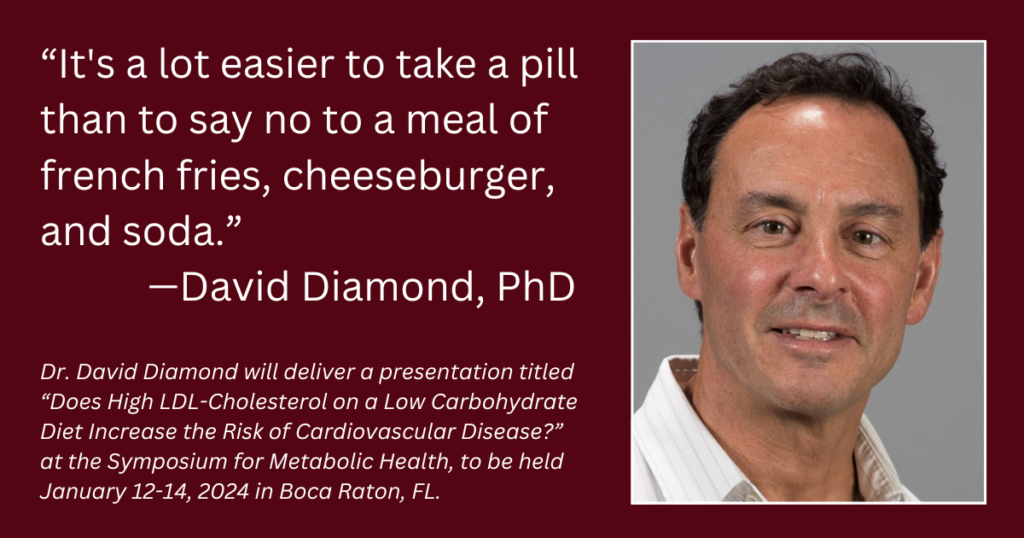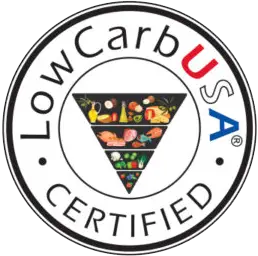Neuroscientist to Address pressing question: Does High LDL-C on a Low Carb Diet Increase Risk of CVD?
We recently had the privilege of speaking with Dr. David Diamond, a renowned neuroscientist who has pivoted his expertise to become a significant figure in the world of metabolic health. He has become extremely well known for his work assessing the value of LDL-C as a cardiovascular disease (CVD) risk factor, as well as the effects of a low carbohydrate diet on other CVD risk factors.
Confirmed as an expert presenter at the upcoming 8th Annual Boca Raton Symposium for Metabolic Health (SMH), slated for January 11-14, 2024, Dr. Diamond’s session titled ‘Does High LDL-Cholesterol on a Low Carbohydrate Diet Increase the Risk of Cardiovascular Disease?’ will offer groundbreaking insights into the complex interplay between diet, cholesterol, and heart health.
In 2022, Dr. Diamond authored a commentary, along with Dr. Benjamin Bikman and Dr. Paul Mason, titled “Statin therapy is not warranted for a person with high LDL-cholesterol on a low-carbohydrate diet.” He has presented at many SMH conferences and has been a favorite among attendees.
With a PhD in Biology from the University of California, Irvine, specializing in neuroscience, he has made an indelible mark in his field. He recently retired as a Career Scientist in the Department of Veterans Affairs (VA) after almost 30 years of service and is currently a Professor in the Department of Psychology, Cognitive, Neural and Social Science Division, at the University of South Florida.
With a publication portfolio exceeding 150 works, including reviews and book chapters, Dr. Diamond’s research has been supported by esteemed organizations such as the VA, the National Institutes of Health (NIH), Department of Defense (DoD), and National Science Foundation (NSF), as well as various pharmaceutical companies.
Renowned for his ability to distill complex scientific concepts into accessible knowledge, Dr. Diamond’s influence transcends academia. His lectures, which have captivated audiences worldwide and amassed over a million views, underscore his role in shaping healthcare professionals’ and the public’s perspectives on cholesterol and its implications for health.
Dr. Diamond’s presentation is particularly timely, as the medical community and the public alike grapple with understanding the complexities of dietary choices and their impact on long-term health. Dr. Diamond’s focus on the relationship between LDL cholesterol and low carbohydrate diets in cardiovascular disease is a topic of immense relevance, considering the rising popularity of various dietary regimes and the ongoing debates about their effects on heart health. The conversation has amped up recently with the new developments in the Lean Mass Hyper-responder (LMHR) study being released just last week by principal investigator Matthew Budhoff (more details below).
“Does High LDL-C on a Low Carb Diet Increase Risk of CVD?”
Dr. Diamond’s highly anticipated talk is set to challenge prevailing beliefs about LDL cholesterol and its role in cardiovascular disease. Titled “Does High LDL-Cholesterol on a Low Carbohydrate Diet Increase the Risk of Cardiovascular Disease?” his exploration of this topic promises to be an eye-opener for many of the practitioners and laypeople in attendance.
At the heart of Dr. Diamond’s discussion is the challenging of what he asserts are long-held misconceptions about LDL cholesterol. He passionately disputes the common narrative that LDL cholesterol is a primary contributor to heart disease. “LDL has been vilified, it has been blamed for causing heart disease, which is, in my view, wrong,” Dr. Diamond emphatically states, suggesting a need for a more nuanced understanding of LDL cholesterol, especially in the context of metabolic health.
Another significant aspect of Dr. Diamond’s presentation revolves around the influence of financial interests in medical research, particularly concerning LDL cholesterol. He critically examines the portrayal of LDL cholesterol as a major cause of heart disease, a portrayal he believes is significantly influenced by industry profits. Dr. Diamond raises an essential question, “There’s a grander scheme of things, which is, should people be concerned about LDL cholesterol at all? under any condition?” calling for unbiased and independent scientific inquiry.
Dr. Diamond also plans to discuss the importance of distinguishing between different types of LDL particles. He argues that not all LDL particles are equally harmful, with small, dense LDL particles being more closely associated with heart disease than the total LDL cholesterol level. He asserts this distinction is crucial for a comprehensive understanding of the risk factors for heart disease.
In a personal touch to his presentation, Dr. Diamond will share his journey of dramatically improving his own health markers by altering his diet, particularly by reducing carbohydrate intake. This change led to a significant decrease in his triglycerides and an increase in HDL cholesterol.
“25 years ago, I was faced with a problem, my doctor demanded that I go on a statin. My triglyceride/HDL ratio was over 20 to one,” he shares, highlighting the transformative power of dietary modifications over conventional medication.
Addressing the challenges within the medical community, Dr. Diamond expresses his frustration over the reluctance of mainstream medical practitioners and researchers to engage in open debate about the role of LDL cholesterol and the effectiveness of statins. He attributes this reluctance to financial conflicts and adherence to outdated guidelines, which hinders progress in understanding and treating cardiovascular diseases.
“The people who are in power and those in authority, many of them cardiologists, are dismissive of people like me who I think objectively evaluate the evidence. We’re called LDL deniers,” Dr. Diamond says.
Dr. Diamond also plans to point out the troubling trend of prioritizing medication over lifestyle changes in managing obesity and related health issues. He emphasizes the need for a shift towards more holistic health management strategies that address the root causes through diet and lifestyle modifications. “It’s a lot easier to take a pill than to say no to a meal of french fries, cheeseburger, and soda,” he remarks.
Dr. Diamond’s presentation at the Boca Raton Symposium is poised to offer a fresh and scientifically grounded perspective on the complex interplay between diet, cholesterol, and heart health. He says he hopes his insights do more than challenge conventional wisdom but also to empower healthcare professionals and individuals to make informed decisions about their health and wellness strategies.
The Boca Symposium: A Convergence of Expert Insights
Dr. Diamond highlighted the significance of the conference as a platform for meaningful dialogue, particularly for physicians who face challenges in advising their patients about diet and cholesterol. He acknowledged the apprehensions physicians have about potentially putting themselves in jeopardy due to the advice they give. “They’re concerned about giving advice that could potentially lead to them being challenged,” Dr. Diamond noted. His presentation and discussions at the conference are tailored to provide these practitioners with solid scientific information that can alleviate their fears and uncertainties regarding diet and cholesterol management.
Furthermore, Dr. Diamond stressed the importance of the social aspects of the conference. “There’s a lot of opportunity for one-on-one discussions, and there are these social events, which I find really helpful,” he stated. These interactions allow for the exchange of information and experiences behind the scenes, benefiting both physicians and laypeople.
Dr. Diamond also pointed out that he, too, learns from these interactions. The conference serves as a venue for him to gain insights from other presenters and attendees. “I’m also there to learn from the other presenters. And also I’m there to learn from people who are coming to the meetings,” he explained. This mutual exchange of knowledge and experiences enriches the understanding of all participants, making the conference an ideal setting for those seeking to deepen their understanding of LDL cholesterol and its impact on health.
Lean Mass Hyper-responders
Dr. Diamond is closely following the ongoing, groundbreaking study led by Matthew Budoff on the Lean Mass Hyper-responder (LMHR) phenotype, a subject that has garnered intense interest in the realm of lipid science. LMHRs represent a group of individuals who, upon adopting low carbohydrate or ketogenic diets, exhibit significant increases in LDL cholesterol (LDL-C) along with increases in HDL cholesterol and lower triglycerides.
This research, funded by Dave Feldman’s Citizen Science Foundation, seeks to understand whether these otherwise healthy individuals face greater risks due to their elevated LDL-C levels. Recent data released by principal investigator Matt Budoff revealed that the LMHR group, with an average LDL-C of 272 mg/dL, showed either the same or possibly lower total plaque amounts than a control group. This finding challenges the conventional belief that high LDL-C levels are inherently linked to increased cardiovascular risk. Follow-up scans are scheduled to be performed, collecting more data in Feb 2024.
“I believe Dave Feldman’s work and mine are entirely complementary,” Diamond states, expressing admiration for Feldman’s meticulous research and ability to challenge conventional wisdom. Dr. Diamond underscored that the LMHR phenotype does not necessarily heighten the risk of heart disease, despite the elevated LDL-C levels. “The lean mass hyper-responder is not at increased risk for developing heart disease, because high LDL alone is not a concern for heart disease when all other biomarkers are good.”
Dr. Diamond’s enthusiasm for the study’s ongoing results is palpable. He predicts, “These people are going to be extraordinarily healthy.” He also acknowledges the potential skepticism from some experts who might argue that a longer time frame is needed to fully assess the risk of heart disease in LMHR individuals. Nevertheless, he confidently asserts that the current science does not indicate an increased risk of heart disease for these individuals, even over extended periods.
Neuroscience: PTSD and “Forgotten Baby Syndrome”
On another note, Before venturing into the intricacies of cholesterol and heart health, Dr. Diamond’s extensive research in neuroscience shed light on posttraumatic stress disorder (PTSD) and led to his investigation of “forgotten baby syndrome.” This tragic phenomenon, where parents accidentally leave their children in hot cars, often with fatal consequences, piqued Dr. Diamond’s interest due to its connection with stress and memory.
“I was funded by the VA to study PTSD. That was a main interest of my area of research,” he reflects. His exploration into PTSD revealed significant links between stress-related disorders and physical health, particularly cardiovascular health. This research emphasized the complex relationship between mental health, dietary habits, and physical well-being.
Dr. Diamond’s contributions extend beyond PTSD; his work on Alzheimer’s disease and his role as a public educator and legal expert witness in cases of forgotten baby syndrome underscore his diverse expertise. Additionally, Dr. Diamond is a member of a national committee dedicated to children’s safety. In this role, he has been instrumental in advocating for the implementation of safety features in new cars, a task that has faced some resistance from the auto industry.
Register for the 2024 Boca Symposium
The 2024 Boca Symposium will present an extensive program covering a broad spectrum of metabolic therapy topics. This includes sessions on carbohydrate reduction strategies for, and research in, type 2 diabetes, fatty liver, obesity, cardiovascular disease, neurological disorders, as well as mental health conditions, and so much more, offering groundbreaking insights into contemporary treatment modalities.
In addition to these much anticipated presentations the 2024 Boca Symposium will serve as a critical event for the Type 1 diabetes community, attracting both patients and medical professionals. It features a specially curated workshop for practitioners scheduled for Thursday, January 11th (RSVP required) with a comprehensive day dedicated to type 1 diabetes discussions on Friday, January 12th.
Learn more about the Symposium for Metabolic Health in Boca Raton, FL, January 11-14.



